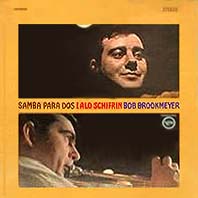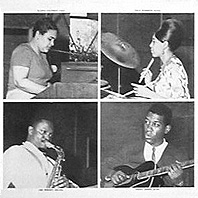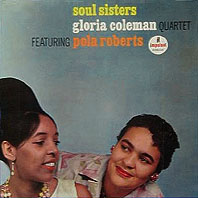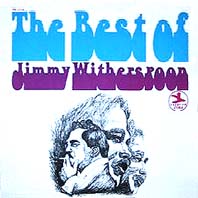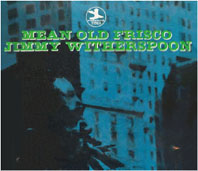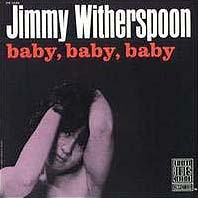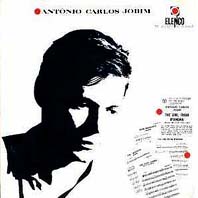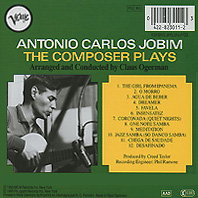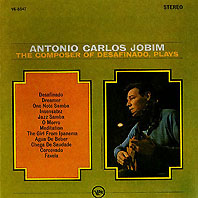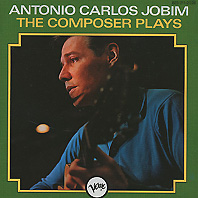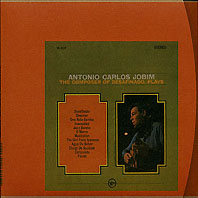 |
DISCOGRAPHY PART 3 |
 |
|
| biography 1 2 3 |
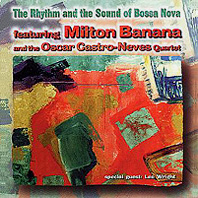 UBATUQUI UBCD 303 l 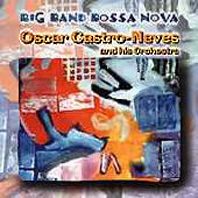 |
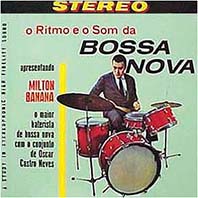
|
The Rhythm And The Sound Of Bossa Nova / Milton Banana and The Oscar Castro Neves Quartet, special guest: Leo Wright recorded: December 8/9, 1962 in New York issues: 1962 UBATUQUI / AUDIO FIDELITY (Spain) ; CD UBATUQUI 3177224 ; ORPHEUS PRODUCTIONS/KENYA MUSIC ; BOMBA RECORDS BOM22112 ; UBATUQUI UBCD 303 also issued as Miltinho (Milton Banana) - The Rhythm & Sound Of Bossa Nova 1963 AUDIO FIDELITY (Spain) #3,5,8-10,12 also on Big Band Bossa Nova - Oscar Castro-Neves And His Orchestra 1962 AUDIO FIDELITY 5983 & UBATUQUI UBCD OSCAR CASTRO NEVES-QUARTET, OSCAR CASTRO-NEVES (p, arr); LEO WRIGHT (as, fl); HENRY PERCY WILCOX (g); IKO CASTRO-NEVES (b); MILTON BANANA (dr)
|
|||
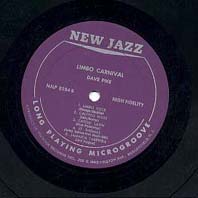
|

|
Limbo Carnival / Dave Pike recorded: December 12, 1962 at the Van Gelder Studio, Englewood Cliffs, New Jersey original release: 1962 LP PRESTIGE NEW JAZZ NJST-8284 purple label ; re-issued 2000 as Carnavals PRESTIGE 24248 (2 LP´s on 1 CD, see next LP) DAVE PIKE (vib, marimba, arr.); LEO WRIGHT (as, fl on 4 tracks); TOMMY FLANAGAN (p on 5 tracks); JIMMY RANEY (g on 4 tracks); GEORGE DUVIVIER (b on 4 tracks), AHMED ABDUL-MALIK (b on 6 tracks); WILLIAM CORREO (dr); RAY BARETTO (cga) Side A 1. La Bamba (Richie Valens) 2. My Little Suede Shoes (Parker) 3. Matilda 4. Mambo Bounce Side B 1. Limbo Rock 2. Calypso Blues 3. Cattin’ Latin (Pony Poindexter) 4. St. Thomas (Sonny Rollins) 5. Jamaica Farewell |
| Reviews:
Dave Pike isn't one of jazz's more famous vibists - he never became
as well known as Milt Jackson, Lionel Hampton, Cal Tjader, Bobby Hutcherson,
or Roy Ayers. Nonetheless, Pike is a talented, flexible player who
has provided some memorable albums here and there.Two of them are
Bossa Nova Carnival and Limbo Carnival, both of which were recorded
in 1962 for New Jazz. In 2000, Fantasy reissued the albums back to
back on the Prestige CD Carnavals. The sessions are equally appealing
but quite different - while Bossa Nova Carnival is a caressing, sensuous
collection of songs by Brazilian composer Joao Donato, the grittier
Limbo Carnival has more of a Caribbean orientation. Afro-Cuban salsa
is an influence on Limbo Carnival, but calypso is an even greater
influence - and Pike, taking a hint from Sonny Rollins, combines jazz
with calypso on Rollins' 'St. Thomas' and Charlie Parker's 'My
Little Suede Shoes', as well as two songs that were hits for Harry
Belafonte: 'Matilda' and 'Jamaica Farewell'. On both dates, the vibist
(who plays the marimba as a second instrument) is joined by some heavy-weights
- Bossa Nova Carnival features, among others, Clark Terry on flugelhorn
and Kenny Burrell on guitar, while pianist Tommy Flanagan, guitarist
Jimmy Raney, and percussionist Ray Barretto are among the sidemen
on Limbo Carnival. -- When vibist Dave Pike recorded the 1962 LP´s paired on this disc, U.S. Jazz was being revitalized by the new wave of Brazil’s Bossa Nova, while on the Pop side, dance fever raged on. Kicked off in 1960- 61 by Chubby Checker’s global mega-smash ‘The Twist’, there followed a series of dance hits including Checker’s ‘Limbo Rock’, which is covered herein. At the time of these two lively, tuneful albums, Pike (b. 1938) was employed by the popular jazz flutist Herbie Mann, whose repertoire successfully drew on both Latin music (like Bossa Nova) and some dance hits. It was no surprise, then, that the vibist was thoroughly conversant in the sounds of Carnavals. -- |
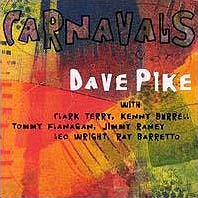
|
Carnavals / Dave Pike issued: 2 LP´s on 1 CD, 2000, CD FANTASY/PRESTIGE 24248-2 reissue of Bossa Nova Carnival & Limbo Carnival Bossa Nova Carnival recorded: September 6 & 7, 1962 in New York/NY original release: NEW JAZZ 8281 DAVE PIKE (vib, marimba); CLARK TERRY (fl-h); KENNY BURRELL (g); CHRIS WHITE (b); RUDY COLLINS (dr); JOSE PAULO (cabasa, bandero). Engineer: Ralph Scuff Limbo Carnival recorded: December 12, 1962 at Van Gelder Studio, Englewood Cliffs/NJ; original release: NEW JAZZ 8284 DAVE PIKE (vib, marimba); LEO WRIGHT (as, fl); TOMMY FLANAGAN (p); JIMMY RANEY (g); GEORGE DUVIVIER, AHMED ABDUL-MALIK (b); WILLIAM CORREA (dr); RAY BARRETTO (cga) Engineer: Rudy Van Gelder Bossa Nova Carnival (written by João Donato) 1. Sambolero 2. Sono 3. Serenidade (Serenade) 4. Carnaval Samba (aka Carnaval) 5. Philumba 6. Melvalita 7. Ginha 8. Sausalito Limbo Carnival 9. La Bamba (Richie Valens) 10. My Little Suede Shoes (Parker) 11. Matilda 12. Mambo Bounce 13. Limbo Rock (Chubby Checker) 14. Calypso Blues 15. Cattin' Latin (Pony Poindexter) 16. St. Thomas (Rollins) 17. Jamaica Farewell |
|
| Enregistré en 1962, soit à peu près quatre ans après la naissance de ce que l'on a appelé la bossa nova, l'album est typique de ce style. D'ailleurs, le guitariste et chanteur Luiz Bonfá, à la suite des pionniers Joao Gilberto, Antonio Carlos Jobim et Vinicius de Moraes, en fut un des représentants parmi les plus prisés avec Edu Lobo et le guitariste Baden Powell on doit à Bonfá le célèbre 'Manha De Carnaval' qui immortalisa la bande originale du film Orfeu Negro. Cinema novo, rhythmes nouveaux: le Brésil vit alors sa révolution culturelle. Exit la samba traditionnelle, place à des arrangements nonchalants et à ce détachement qui fait référence à la saudade. Avec l'excellent guitariste Oscar Castro-Neves (déjà remarqué sur Sergio Mendes Presents Edu Lobo) et le flûtiste Leo Wright enrôlés dans des arrangements signés par Lalo Schifrin, Luiz Bonfá joue ses standards les plus connus dont les fameux 'Samba De Duas Notas (Two Notes Samba)' et 'Tristeza (Brazillian Blues)'. Sensualité de la voix, pré-dominance d'accords de guitare cool à souhait: l'imagerie qu'éveille cette musique est pleine de nostalgie et son charme est demeuré intact. | 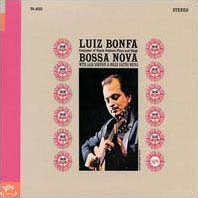 |
The Composer Of Black Orpheus Plays And Sings Bossa Nova / Luiz Bonfá recorded: December 26 & 31, 1962 at A&R Recording Studios, New York original release: 1962 VERVE 8522 ; issues: 1962 UNI/VERVE ; 1963 VERVE 2331418 ; 2000 CD VERVE/POLYGRAM 543378 LUIZ BONFA (g, voc, acc); OSCAR CASTRO-NEVES (g, org, p); LEO WRIGHT (fl on # 5, 8, 13); MARIA HELENA TOLEDO (voc); IKO CASTRO-NEVES (b); ROBERTO PONTES-DIAS (dr, perc); LALO SCHIFRIN (arr)
|
||
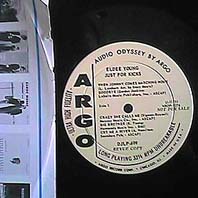 |
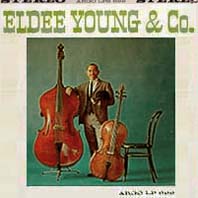 |
Just For Kicks / Eldee Young And Company recorded: December 28, 1962 at Ter-Mar recording studio, Chicago, ILL original release: 1962 ARGO JAZZ LPS-699 (USA) ; other issues: ARGO LPS-1003 ; CADET ? ELDEE YOUNG (b, cello, voc); LEO WRIGHT (as, fl); MAL WALDRON (p); RICHARD EVANS (b); ISAAC "RED" HOLT (dr)
Note: Eldee Young and Red Holt were Ramsey Lewis´s rhythm section. |
||
| Reviews:
Tin Tin Deo couples the entirety of Lalo Schifrin's very rare 1962 Roulette
album, Lalo=Brilliance, with the five tracks Schifrin arranged for Antonio
Diaz Mena's even rarer 1963 Audio Fidelity album, 'Eso Es Latin Jazz
Man'. None of these 13 tracks had been issued on CD before this 2001
Spanish release. The CD sounds good, though, catching Lalo in an especially
Latin mode throughout. Schifrin's album features a sextet - the core
of Dizzy Gillespie's rhythm section of the time - while the Mena album
features a somewhat larger group with Clark Terry as featured guest.
Both will sound familiar to anyone who has heard Lalo wax poetic on
Latin themes. But there's a bit more of an edge here. The 8 tracks from
Lalo=Brilliance feature some of Schifrin's most arresting piano work.
In both cases, though, it is reedman Leo Wright who shines brightest
(if you don't count the sparkling 'Schifrinesque' moods throughout).
Two tremendous - and markedly different versions of Diz's 'Kush' are
heard here with fascinating covers of 'Harlem Noc- turne', 'Rhythm-A-Ning'
as well as Lalo's must-hear compositions, 'Mambo Jazz Opus No. 7', 'The
Snake's Dance', 'Syphros' and 'Mount Olive'. -- Sublime early work from Lalo Schifrin, recorded in New York in 1962, back when he was fresh from Argentina - the hot young Latin pianist working in Dizzy Gillespie's crack early 60s combo - this work was originally issued |
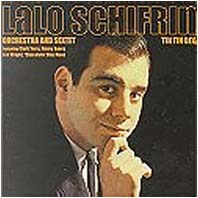
|
Tin Tin Deo / Lalo Schifrin Orchestra And Sextet recorded: 1962 & 1963 issued: 2001 FRESH SOUND FSR-CD 319 (Spain) ; #6-9,11-13 also on The Piano Of Lalo Schifrin ROULETTE BIRDLAND 402 773 (Germany) #1-5 from Eso Es Latin Jazz, Man / Antonio Diaz Mena, rec. July 1963 in NYC LP AUDIO FIDELITY AFLP 6117 ANTONIO 'CHOCOLATE' DIAZ MENA (cga); CLARK TERRY (tp); JIMMY CLEVELAND (tb); JEROME RICHARDSON (bar-s, fl); SELDON POWELL (ts, fl); LEO WRIGHT (as,fl); FELIPE YANEZ (p); FRANK SCHIFANO (b); RUDY COLLINS (dr); VICTOR ALENDE, MEGUIL AVILA (perc); LALO SCHIFRIN (arr, cond) >> see below #6-13 from Lalo = Brilliance / Lalo Schifrin, rec. 1962 in NYC, ROULETTE SR-52088 ; 1966 ROULETTE BIRDLAND R(S) 52088 LALO SCHIFRIN (p); LEO WRIGHT (as, fl); JIMMY RANEY (g); ART DAVIS (b); RUDY COLLINS (dr); WILLIE RODRIGUEZ (cga, bgo, perc) >> see disco 2
* same or similar, Duke Pearson or Felipe Yanez (arr, cond) replaces Lalo Schifrin |
|||
| ReviewsJohn
Lewis formed Orchestra U.S.A. as a vehicle to potentially explore
any composed or improvised music, blending elements of jazz and classical
music by recruiting some first-rate players from both worlds. The
result is one of the more successful third stream recordings. On this
recording there are 2 string quartets, plus woodwinds, brass, and
a rhythm section present. Collaborating with Gunther Schuller, who
conducted the group and did some of the orchestrations, Lewis expanded
his work ‘Three Little Feelings’ from its original chart
for brass, featuring outstanding solos by alto saxophonist Phil Woods
and guitarist Jim Hall. Lewis includes two pieces he had written for
William Inge's play Natural Affection Dolphy's fireworks on ‘Donnie's
Theme’ contrast with the easy-going ‘Natural Affection’,
which features the leader's piano and has a sudden dramatic finale.
Gary Mc Farland contributed both ‘Milesign’ and ‘Grand
Encounter’ the former composition is a driving bop chart with
a typically angular alto sax solo by Dolphy, while the latter piece
is quirky and has a playful solo by Lewis. Schuller's stiff arrangement
of ‘The Star Spangled Banner’ serves as a odd but brief
coda to close the record. Although there were additional records by
Orchestra USA, none of them match the heights of this initial effort,
which is long out of print and deserves to be re-issued on CD. -- In fall 1962, John Lewis, with the assistance of Gunther Schuller and percussionist Harold Farberman, formed Orchestra USA. The purpose of the huge orchestra (which included a string |
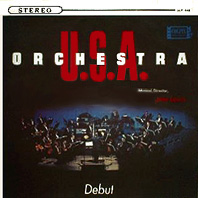
|
Orchestra U.S.A. Debut / Orchestra U.S.A. recorded: January 12 (#1), February 4 & 27, 1963 at Atlantic Recording Studios, NYC issues: 1963 COLPIX CLP-448 (mono) ; COLPIX SCP-448 (stereo); COLPIX (G) 9002 re-issued: September 7, 2004, 2 LP´s on 1 CD LONE HILL JAZZ LHJ 10117 as: Orchestra U.S.A. The Debut Recording - John Lewis >> see disco 9 recorded: January 12 (#1), February 4 & 27, 1963 at Atlantic Recording Studios, NYC issues: 1963 COLPIX CLP-448 (mono) ; COLPIX SCP-448 (stereo); COLPIX (G) 9002 JOHN LEWIS (p, prod., musical dir.); NICK TRAVIS, LOUIS MUCCI, HERB POMEROY (tp); MIKE ZWERIN (tb); WALLY KANE (fl, bassoon); LEO WRIGHT (fl); ROBERT DI DOMENICA (picc-fl); ERIC DOLPHY (fl, as); PHIL WOODS (cl, as); ROBERT NORTHERN, ROBERT SWISSHELM (fr-h); DON STEWART (cl, basset-h); PHILIPP WEST (oboe, engl-h); RAY SHINER (oboe); DON ASHWORTH (oboe, bar-s); HARVEY PHILLIPS (tu); JIM HALL (g); NICK TRAVIS (p); ALFRED BREUNING, GERALD BEAL, NATHAN GOLDSTEIN, GINO SAMBUCCO, JERRY WIDOFF (v); JULIAN BARBER, AARON JUVELIER, SELWART CLARK (viola); ALLAN GOLDBERG (cello); JOSEPH TEKULA, RICHARD DAVIS (b); CONNIE KAY (dr); STICKS EVANS, GARY MCFARLAND (perc); MICHAEL COLGRASS (orchestr. bells); GUNTHER SCHULLER (cond., orchestration, liner notes); TOM DOWD (engineer) on #A2,3, B2 Aaron Juvelier out, on #B1,3,4 Gary McFarland, Alfred Breuning out
Orchestra U.S.A. discography |
|||
| Jobim derived his unmistakable songwriting style from a very personal sense
of melody and harmony, the magnificent songwriting traditions of Brazil,
the rythm of the samba, and his love and respect for American Jazz.
'The Composer of Desafinado Plays' followed the success of the title
song's Grammy winning performance by Stan Getz in 1962 and helped to
secure the immense popularity of the Bossa Nova to this day. -- The digitally remastered 1997 reissue of Jobim's classic LP is part of the Verve Master Editions series. It offers instrumental interpretations of some of Jobim's most famous compositions from the salad days of the early '60s Bossa Nova craze. It's also one of the earliest examples of his longstanding and fruitful collaboration with arranger Claus Ogerman, who conducts the orchestra, featuring Jimmy Cleveland, George Duvivier and Leo Wright. Trademarks like Jobim's single-note piano style, the accompanying flute melodies and Ogerman's arranging techniques (unison string parts, the bass clarinet underpinnings in 'How Insensitive') would decorate Jobim's music for the next two decades. Similarly representative are the authentic Bossa |
Nova guitar and drums, subtle variations of which occur on each tune. Throughout the recording, Jobim's songs are powerful. The composer who almost single-handedly made the Brazilian sound an integral part of the 60s (and right through to today) and who, along with Luiz Bonfá, introduced Bossa Nova to the world via the beautiful '60s Brazilian film "Black Orpheus". This man has worked with everyone from Frank Sinatra to Stan Getz to the biggest names in world jazz. This album was recorded on May 9th and 10th, 1963 in New York City (recording engineer was Phil Ramone) and these 12 tracks are small, sparse, beautiful versions of his songs. Jobim plays guitar on most cuts, piano on a few; and while there are other backing instruments in places, the only other soloists are Jimmy Cleveland on trombone and Leo Wright on flute. Jobim was only 36 when this album was recorded and it's a rare treat to hear these songs done the way he heard them then, before the scores of versions of some of them became known to everyone. The cover is a foldout - inside one side is a photo of the artist playing guitar; on the other side is an in-depth look at Jobim and Brazilian music along with a track by track explanation of each song, with Jobim's comments on each. The notes are by Dom Cerulli. | ||
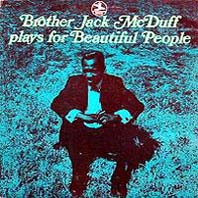 |
Plays For Beautiful People / Brother Jack McDuff recorded: #1 January 25, #2 July 12, 1960, #3,4 February 3, 1961, #5 October 23, 1962, #6 January 8, #7,8 February 26,1963 at VGS, Englewood Cliffs/NJ. issued: 1963 PRESTIGE PR 7596 (US) #5 originally from Screamin' - Brother Jack McDuff PRESTIGE 7259 >> see disco 2 BROTHER JACK MCDUFF (org); JIMMY FORREST (ts #2-4); LEO WRIGHT (as #5); HAROLD VICK (ts #6,8); ERIC DIXON (ts, fl #6); LEM WINCHESTER (vib #2); BILL JENNINGS (g #1); GRANT GREEN (g #3,4); KENNY BURRELL (g #5-8); WENDELL MARSHALL (b #1); ALVIN JOHNSON (dr #1); BILL ELLIOTT (dr #2); BEN DIXON (dr #3,4); JOE DUKES (dr #5-8); RAY BARRETTO (cga #6,8) 1. You're Driving Me Crazy 2. Mean To Me 3. I Want A Little Girl [2862] 4. Mr. Lucky [2863] 5. I Cover The Waterfront 6. It's A Wonderful World 7. The Breeze And I [3750] 8. We'll Be Together Again [3754] |
|
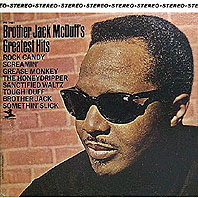 click image to enlarge |
Brother Jack McDuff Greatest Hits recorded: #1 January 25, #2 July 12, 1960, #3 February 3, #4 July 14, 1961, #5 October 23, 1962, #6 Jan. 8, 1963 at VGS, Englewood Cliffs/NJ. #7 June 5, 1963, "Front Room", Newark/NJ. #8 October 3, 1963, at "The Jazz Workshop", San Francisco/CA. issued: 19?? LP PRESTIGE 7481 #5 originally from Screamin' - Brother Jack McDuff PRESTIGE 7259 >> see disco 2 BROTHER JACK MCDUFF (org); JIMMY FORREST (ts #2,3); HAROLD VICK (ts #4,6; ts, fl #7,8); LEO WRIGHT (as #5); ERIC DIXON (ts, fl #6); RED HOLLOWAY (ts #7; ts, ss #8); LEM WINCHESTER (vib #2); GRANT GREEN (g #3,4); KENNY BURRELL (g #5,6); GEORGE BENSON (g #7); BILL JENNINGS (g #1), WENDELL MARSHALL (b #1); ALVIN JOHNSON (dr #1); BILL ELLIOT (dr #2); BEN DIXON (dr #3); JOE DUKES (dr #4-8); RAY BARRETTO (cga #6)
|
|||
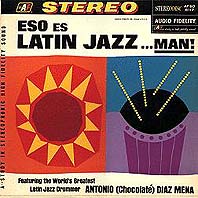 |
Eso Es Latin Jazz ... Man ! / Antonio Diaz Mena recorded: July 1963 in New York City issues: AUDIO FIDELITY AFLP-6117, AFSD-6117 (and -2117?) ; #1 - 5 also on Tin Tin Deo - Lalo Schifrin FRESH SOUND FSR-CD 319 (Spain) ANTONIO "CHOCOLATÉ" DIAZ MENA (cga); CLARK TERRY (tp); JIMMY CLEVELAND (tb); LEO WRIGHT (as, fl); SELDON POWELL (ts, fl); JEROME RICHARDSON (bar-s, fl); FELIPE YANEZ (p; arr, cond #11, 12); FRANK SCHIFANO (b); RUDY COLLINS (dr); VICTOR ALENDE, MEGUIL AVILA (perc); LALO SCHIFRIN (arr, cond #1-5); DUKE PEARSON (arr, cond #6-10)
|
|||
| Review: Although this Blue Note session (reissued on CD in 1996) is led by trumpeter Johnny Coles, pianist Duke Pearson (who contributed the arrangements and five of the six compositions) really functioned as leader. The typically impressive Blue Note lineup (which includes Leo Wright on alto and flute, tenor saxophonist Joe Henderson, bassist Bob Cranshaw and either Walter Perkins or Pete LaRoca on drums in addition to Coles and Pearson) handles the obscure material with creative invention. Most memorable are the catchy title cut and the somber ballad 'So Sweet My Little Girl'. Cole's brittle trumpet is the lead voice throughout although the young Joe Henderson was already instantly recognizable. | 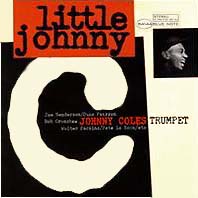 |
Little Johnny C / Johnny Coles recorded: July 18 (Side A), Aug. 9 (Side B), 1963 at Van Gelder Studio, Englewood Cliffs/NJ issues: 1963 LP BLUE NOTE BN-4144 ; 1963 LP BLUE NOTE BST-84144 (stereo) ; 1996 CD BLUE NOTE/CAPITOL CDP 32129 (Blue Note Connoisseur Series) ; TOSHIBA-EMI TOCJ-4144 (Japan) JOHNNY COLES (tp); JOE HENDERSON (ts); LEO WRIGHT (as, fl); DUKE PEARSON (p); BOB CRANSHAW (b); WALTER PERKINS (dr on Side A), PETE LA ROCA (dr on Side B)
|
||
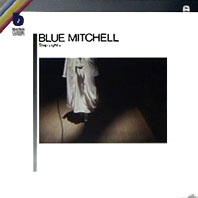 BLUE NOTE Classic / LIBERTY LT-1082
BLUE NOTE Classic / LIBERTY LT-1082
|
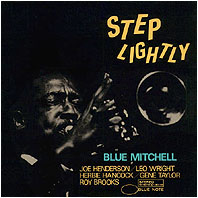 KING GXK-8182 / click image to enlarge KING GXK-8182 / click image to enlarge |
Step Lightly / Blue Mitchell recorded: August 13, 1963 at the Van Gelder Studio, Englewood Cliffs/New Jersey original release: 1980 LP BLUE NOTE RECORDS LT-1082 ; re-issues: LIBERTY LT-1082 ; 1994 CD BLUE NOTE TOJC 4142 (Japan) ; TOSHIBA/EMI 188 (Japan) ; 1980 BLUE NOTE 84142 (Japan) ; 1981 KING GXK-8182 (Japan) also on The Complete Blue Mitchell Blue Note Sessions (1963-67) 1998 4 CD Box Set MOSAIC RECORDS MD4-178 ; #2 also on Joe Henderson - The Blue Note Years 1993 CD BLUE NOTE B2-89287 BLUE MITCHELL (tp); JOE HENDERSON (ts); LEO WRIGHT (as); HERBIE HANCOCK (p); GENE TAYLOR (b); ROY BROOKS (dr)
|
| Reviews: This is the third Prestige album Burrell made with Coleman Hawkins, each with a different mood. The first, 'Soul', was a gentle small group session with a nice version of 'Greensleeves'. The next, the underrated 'The Hawk Relaxes', was a graceful bal- lad set, originally for the Moodsville label. This record was also for Moodsville, but this mood is sad, contemplative, and at times gentle. It's also the last Hawkins session for Prestige. He clearly enjoys playing with Burrell, as much as you'll enjoy playing the record. Without knowing the production details, this sounds much more organized than a lot of Prestige sessions. The players know each other very well: Tommy Flanagan and Ray Barretto had done many sessions with the leaders, and Eddie Locke and Major Holley were in the Hawkins group at the time. While the group is a sextet, the album boasts 5 different lineups. Burrell has a solo recording (a slow, pretty, and too short version of 'No More') and follows with a guitar-bass-drums number where the two strings blend well. | 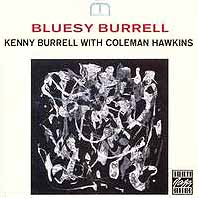 FANTASY/OJC 8354828 |
Bluesy Burrell / Kenny Burrell With Coleman Hawkins recorded: Sep. 14, 1962, August 15, 1963 at Van Gelder Studio, Englewood Cliffs/NJ original release: MOODSVILLE 29 other issues: 1963 MOODSVILLE VICJ60030 ; LP PRESTIGE P-24106 ; 1997 CD ORIGINAL JAZZ CLASSICS 926 ; April 4, 1997 CD FANTASY/OJC 8354828 KENNY BURRELL (g); COLEMAN HAWKINS (ts); LEO WRIGHT (as); TOMMY FLANAGAN,GILDO MAHONES (p); MAJOR HOLLEY, GEORGE TUCKER (b); EDDIE LOCKE, JIMMY SMITH (dr); RAY BARRETTO (cga) 1. Tres Palabras (Farres) 2. No More 3. Guilty 4. Montono Blues 5. I Thought About You (Mercer/Van Heusen) 6. Out Of This World 7. It's Getting Dark (Burrell) 8. I Never Knew |
| When Barretto takes a breather, we get a Hawkins-Burrell dialogue on 'I Thought About You' which I consider the highlight of the album. Bean is more aggressive here than on 'The Hawk Relaxes', and his bite brings a lot of strength to this date. Then he sits down, and it's Burrell and Barretto for 'Out Of This World', which driftssoftand sad with great interplay from drums and conga. Barretto also gets a solo, his only one here. These numbers alone show many moods and many tempos, with only a few of the pretty ballads expected from this label. It's already worthy of your ears - and then you hear the tracks with the full band. The sextet appears three times, and all are keepers. 'Tres Palabras', the opener, starts slow and develops slower. Flanagan and Barretto start a pattern which is gradually built by Burrell (a gentle, almost Brazilian solo), Flanagan (a single-note pattern based on his comping figures) and lastly Hawkins, pushing forward with a slow power, an understated authority. When he comes in, all is ready, and the others chug behind him, giving Bean a space to work his magic. Needless to say, he does. 'Montono Blues' is forceful, led by a tough Burrell rhythm part and a fun bowed bass by Holley, singing along a la Slam. 'It's Getting Dark' is another blues, this one slower and more relaxed. It's definitely a variety album, with many tunes to choose from. Burrell is the star (his high ringing tone also plays octaves here and there), but everyone has their time in the spotlight, especially Hawkins, having a grand time on his last session for Prestige. An added plus is the liner notes, which give us two insights. First, you can hear the rain in the mood here, especially on 'Tres Palabras' and | 'Out Of This World'. The second is a quote
Burrell made at the session: "C'mon Bean, let's play something pretty." They did. -- that it was raining when the record was made. This session is valuable for the majestic playing of tenor great Coleman Hawkins, who performs on half of the eight tracks. While originally released on the Prestige subsidiary Moodsville - a label that specialized in recordings with an intimate, reflective atmosphere - the Moodsville sound doesn't sit comfortably on Hawkins. His playing is brilliantly relaxed, but it's not mood music. Leader Kenny Burrell's playing is much more in line with the Moodsville groove. The guitarist is not amplified as much as he is on his Prestige dates from this time. In fact, he performs on a nylon-string instrument almost as much as he does on his hollow-body electric. Unlike Hawkins, Burrell's subdued contribution is made to measure for this date. Listeners expecting to hear Burrell the hard bopper won't. The key moments come during the interaction between the guitarist and tenor player, especially during their exchanges on Burrell's 'Montono Blues'. The rhythm section, Hawkins' working band from this period (pianist Tommy Flanagan, bassist Major Holley, and drummer Eddie Locke), provide impeccable, sublime support. The CD is rounded out with an uptempo performance of the standard 'I Never Knew', from a date led by pianist Gildo Mahones. This is where Burrell gets a chance to cook in his classic hard-bop style, along with the fine alto player Leo Wright. |
||
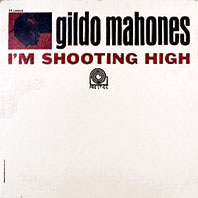 |
I'm Shooting High / Gildo Mahones recorded: August 15, 1963 at VGS-Englewood Cliffs/NJ issues: NEW JAZZ NJLP-8299 ; PRESTIGE 16004 ; 1964 LP PRESTIGE 16006 (mono) #2,9,12,14 also on The Great Gildo - Gildo Mahones 1964 PRESTIGE PRLP-7339 GILDO MAHONES (p); LEO WRIGHT (as); LARRY YOUNG (org); KENNY BURRELL (g); OZZIE BECK (voc); GEORGE TUCKER, PECK MORRISON (?) (b); JIMMY SMITH, OLIVER JACKSON (dr) 1. I'm Shooting High 2. Bali Ha'i 3. Tales of Brooklyn 4. Hey Girl 5. Water Blues Fall 6. Good Morning Heartache 7. Sweetest Sounds 8. Stormy Monday |
|
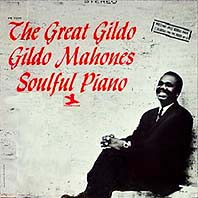 |
The Great Gildo - Soulful Piano / Gildo Mahones original issue: 1964 DoLP PRESTIGE PRLP-7339 GILDO MAHONES (p); LEO WRIGHT (as); LARRY YOUNG (org); KENNY BURRELL (g); GEORGE TUCKER, PECK MORRISON (b); JIMMIE SMITH, SONNY BROWN, OLIVER JACKSON (dr) 1. Blues For Yna Yna 2. Blue 3. I Should Care 4. I Wish You Love 5. What's Become Of Our Love 6. Alone Together 7. Walkin' 8. Something Missing 9. Sweetest Sounds 10. Rainy Dave Love 11. Mambesi 12. Water Blues Fall 13. Oye Ami Piano 14. Good Morning Heartache 15. Bali Ha'i |
|
| 1 2 3 biography I discography 1 2 3 4 (original) 5 6 7 8 9 (compilations) I press |
